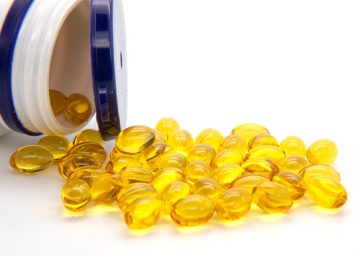The #1 Worst Calcium Supplement to Take, Says Dietitian

Many of us grew up hearing that we need to drink a glass of milk to get enough calcium for strong bones, but this barely even scrapes the surface of what calcium can really do.
Our bodies need calcium for many things like bone health and muscle strength, and when we are getting adequate amounts of calcium we may also experience things like more energy, lower blood pressure, and even better moods.
Yes, you can certainly get calcium from milk, but you can also get it from foods like sweet potatoes, broccoli, and almonds, as well as calcium supplements.
Nevertheless, if you’re going to go the supplement route, it’s important to know which one is the best to buy, and which ones should be avoided.
According to Amy Goodson, MS, RD, CSSD, LD, author of The Sports Nutrition Playbook and a member of our medical expert board, the worst calcium supplement to take is calcium carbonate, especially when it doesn’t come paired with vitamin D.
Why calcium carbonate is the worst to take
Calcium carbonate is a form of calcium found in eggshells, seashells, and pearls. This supplement can come in pill or powder form and has been used as an antacid for heartburn and indigestion relief. Even though carbonate can help your body, it doesn’t do as much for your bone and muscle health as calcium citrate.
“Simply put, calcium carbonate is the worst one to take because it is less absorbed by the body than other types of calcium like citrate,” says Goodson.
What you should take instead
According to Goodson, the best type of calcium supplement to take is calcium citrate with vitamin D.
“Not only is calcium citrate better absorbed than carbonate, but you also increase your absorption when you add in vitamin D,” says Goodson.
Vitamin D is known for helping with immunity, maintaining a healthy gut, and because it helps you absorb calcium, it is great for bone and muscle health as well.
“Without adequate vitamin D levels, your body only absorbs approximately 10 to 15% of the calcium consumed, so the combination of the two is essential,” says Goodson.
You can even get a calcium boost from these 20 Best Calcium-Rich Foods That Aren’t Dairy.
How to get calcium citrate + vitamin D
There are plenty of brands to choose from that sell the blend of citrate and vitamin D. You can try it in pill form, as a chewable tablet, or even in some milk chocolate. An important thing to note about taking calcium is that citrate and carbonate supplements come with different densities of calcium.
According to Harvard Health Publishing, calcium citrate supplements usually contain only about 21% of calcium, so you may need to take more depending on how much calcium you’re wanting to get.
For even more healthy tips, these next:
- Sure Signs You’re Lacking Vitamin D, Say Experts
- Surprising Side Effects of Taking Calcium Supplements After 50
- The #1 Best Food to Eat for Calcium, Says Science








